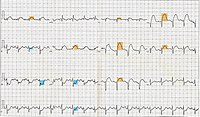
Photo from wikipedia
Bilberries, Vaccinium myrtillus, have a high content of phenolic compounds including anthocyanins, which could provide cardiometabolic health benefits following acute myocardial infarction (AMI). We hypothesized that standard medical therapy supplemented… Click to show full abstract
Bilberries, Vaccinium myrtillus, have a high content of phenolic compounds including anthocyanins, which could provide cardiometabolic health benefits following acute myocardial infarction (AMI). We hypothesized that standard medical therapy supplemented with freeze-dried bilberry after AMI would have a more beneficial effect on cardiovascular risk markers and exercise capacity than medical therapy alone. Patients were allocated in a 1:1 ratio within 24 hours of percutaneous coronary intervention in an 8-week trial either to V myrtillus powder (40 g/d, equivalent to 480 g fresh bilberries) and standard medical therapy or to a control group receiving standard medical therapy alone. High-sensitivity C-reactive protein and exercise capacity measured with the 6-minute walk test were the primary biochemical and clinical end points, respectively. Fifty subjects completed the study. No statistically significant difference in high-sensitivity C-reactive protein was detected between groups. The mean 6-minute walk test distance increased significantly more in the bilberry group compared to the control group: mean difference 38 m at follow-up (95% confidence interval 14-62, P = .003). Ex vivo oxidized low-density lipoprotein was significantly lowered in the bilberry group compared to control, geometric mean ratio 0.80 (95% confidence interval 0.66-0.96, P = .017), whereas total cholesterol and low-density lipoprotein cholesterol did not differ significantly between groups. Anthocyanin-derived metabolites in blood increased significantly in the bilberry group during the intervention and were different after 8 weeks between the bilberry group and control. Findings in the present study suggest that bilberries may have clinically relevant beneficial effects following AMI; a larger, double-blind clinical trial is warranted to confirm this.
Journal Title: Nutrition research
Year Published: 2019
Link to full text (if available)
Share on Social Media: Sign Up to like & get
recommendations!